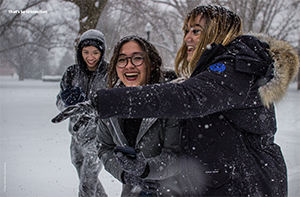As a usually proud alum of Grinnell College, class of 1984, I was shocked and appalled to read [in The Des Moines Register] that the College is fighting the unionization efforts of its students and potentially threatening the organizing rights of college students across the United States. Such action couldn’t be further from Grinnell’s proudest traditions of promoting social justice. When Debra Lukehart, a Grinnell spokesperson, argues that unionization undermines the College’s core educational mission and inserts priorities that are “economic, not educational, into learning outside the classroom,” she misses the boat. To paraphrase the U.S. Supreme Court in its Tinker v. Des Moines School Board decision from 50 years ago, students don’t shed their rights to economic justice at the schoolhouse gate. On a practical matter, less than two percent of Grinnell’s operating expenses go toward student salaries. Is spending hundreds of thousands of dollars in opposing unionization really worth the risk of alienating donors and alumni who expect more from our alma mater
Editor’s note: For context, for the 2016–17 school year, institutional grant aid to students comprised about 27 percent of Grinnell’s operational budget.

 I was saddened to read in the Spring 2018 issue of Ken Christiansen’s death and his wife’s not long afterwards [“In Memoriam,” Page 46]. I took biology from Mr. Christiansen when I was at Grinnell — I graduated in 1959. The classroom was one of those large rooms with banked seats for students. I loved the class, though I was an English and American lit major. What I remember most vividly was that during one of Mr. Christiansen’s lectures, a small squirrel climbed up out of his pocket, where it apparently spent the day, scrambled up the front of his jacket and onto his shoulder, where it peed. Mr. Christiansen smiled and went on with his lecture. What a man!
I was saddened to read in the Spring 2018 issue of Ken Christiansen’s death and his wife’s not long afterwards [“In Memoriam,” Page 46]. I took biology from Mr. Christiansen when I was at Grinnell — I graduated in 1959. The classroom was one of those large rooms with banked seats for students. I loved the class, though I was an English and American lit major. What I remember most vividly was that during one of Mr. Christiansen’s lectures, a small squirrel climbed up out of his pocket, where it apparently spent the day, scrambled up the front of his jacket and onto his shoulder, where it peed. Mr. Christiansen smiled and went on with his lecture. What a man! I find the use of the phrase “That’s so Grinnellian” in your regular photo feature a bit off mark. While my fellow Grinnell friends and I do use this phrase somewhat regularly and I certainly understand trying to tap into that vernacular, using it on a photo simply depicting the Grinnell campus isn’t the proper use of the phrase. The feature as it is currently curated would be more appropriately titled the somewhat less inspired but more accurate: “That’s Grinnell.”
I find the use of the phrase “That’s so Grinnellian” in your regular photo feature a bit off mark. While my fellow Grinnell friends and I do use this phrase somewhat regularly and I certainly understand trying to tap into that vernacular, using it on a photo simply depicting the Grinnell campus isn’t the proper use of the phrase. The feature as it is currently curated would be more appropriately titled the somewhat less inspired but more accurate: “That’s Grinnell.”